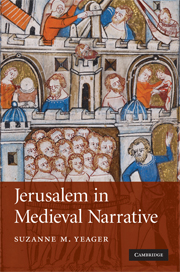Book contents
- Frontmatter
- Contents
- Acknowledgments
- List of abbreviations
- Introduction: texts and contexts
- 1 Pilgrimage to Jerusalem: three accounts by English authors
- 2 Craving heritage: portrayals of Richard I and the English quest for Jerusalem in Richard, Coer de Lyon
- 3 The crusade of the soul in The Siege of Jerusalem
- 4 The Book of Sir John Mandeville: text of pilgrimage and spiritual reform
- 5 Beyond the Celestial and Terrestrial Jerusalem: the Promised Land in western Christendom
- Conclusion
- Notes
- Bibliography
- Index
- CAMBRIDGE STUDIES IN MEDIEVAL LITERATURE
Conclusion
Published online by Cambridge University Press: 22 September 2009
- Frontmatter
- Contents
- Acknowledgments
- List of abbreviations
- Introduction: texts and contexts
- 1 Pilgrimage to Jerusalem: three accounts by English authors
- 2 Craving heritage: portrayals of Richard I and the English quest for Jerusalem in Richard, Coer de Lyon
- 3 The crusade of the soul in The Siege of Jerusalem
- 4 The Book of Sir John Mandeville: text of pilgrimage and spiritual reform
- 5 Beyond the Celestial and Terrestrial Jerusalem: the Promised Land in western Christendom
- Conclusion
- Notes
- Bibliography
- Index
- CAMBRIDGE STUDIES IN MEDIEVAL LITERATURE
Summary
The study of the intersections of pilgrimage and crusade in late medieval narrative reveals the social and political uses of the tropes of militant pilgrimage, and finds that medieval writers utilized the rhetoric of crusade to explore conflicts between France and England, and to articulate an English identity, mobilized around the image of the holy city. In this book, I have sought to expand our views about the medieval implications of writing about Jerusalem. The texts studied here define communal identity expressed through claims of ownership of the holy city and a crusading heritage excelling all others. These views situate Jerusalem as a site of devotion to be meditated on privately and inhabited publicly. As this study observes, such depictions of the holy city were key elements in the creation of a sacralized, English identity. The worth of the terrestrial city of Jerusalem as a spiritual commodity and guarantor of worldly authority was established during the crusades when armed pilgrims were instructed to win that place described to them as Heaven on earth, beloved by God. Although English participation in the early crusades was minimal, later English medieval writers chose to embellish their ties to Jerusalem in crusade-related texts.
- Type
- Chapter
- Information
- Jerusalem in Medieval Narrative , pp. 164 - 172Publisher: Cambridge University PressPrint publication year: 2008

